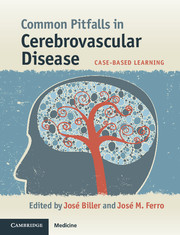Book contents
- Common Pitfalls in Cerebrovascular Disease
- Common Pitfalls in Cerebrovascular Disease
- Copyright page
- Dedication
- Contents
- Contributors
- Preface
- 1 Transient ischemic attacks and stroke mimics and chameleons
- 2 Recognizing transient ischemic attacks in children and young adults
- 3 Transient ischemic attacks (TIAs) – an underrecognized and undertreated disorder
- 4 When the diagnostic image is not diagnostic
- 5 Choosing appropriate patients for anticoagulation
- 6 Antithrombotic management of recurrent atherothrombotic cerebrovascular disease
- 7 Common pitfalls in intravenous thrombolysis for acute ischemic stroke
- 8 Dilemmas in endovascular stroke therapy
- 9 Choosing the right patients for carotid artery procedural interventions
- 10 Stroke and patent foramen ovale: the conundrum of closure
- 11 The diagnosis and overdiagnosis of cerebral vasculitis
- 12 Recognizing cerebrovascular etiologies of “thunderclap” headaches
- 13 Underdiagnosis of reversible cerebral vasoconstriction syndromes
- 14 Moyamoya disease and other non-atherosclerotic cerebral vasculopathies
- 15 Vascular dementia and vascular cognitive impairment
- 16 Pitfalls in the diagnosis of subarachnoid hemorrhage
- 17 Managing hemorrhagic stroke
- 18 Managing patients or managing the results of ancillary tests?
- Index
- References
15 - Vascular dementia and vascular cognitive impairment
Published online by Cambridge University Press: 05 August 2015
- Common Pitfalls in Cerebrovascular Disease
- Common Pitfalls in Cerebrovascular Disease
- Copyright page
- Dedication
- Contents
- Contributors
- Preface
- 1 Transient ischemic attacks and stroke mimics and chameleons
- 2 Recognizing transient ischemic attacks in children and young adults
- 3 Transient ischemic attacks (TIAs) – an underrecognized and undertreated disorder
- 4 When the diagnostic image is not diagnostic
- 5 Choosing appropriate patients for anticoagulation
- 6 Antithrombotic management of recurrent atherothrombotic cerebrovascular disease
- 7 Common pitfalls in intravenous thrombolysis for acute ischemic stroke
- 8 Dilemmas in endovascular stroke therapy
- 9 Choosing the right patients for carotid artery procedural interventions
- 10 Stroke and patent foramen ovale: the conundrum of closure
- 11 The diagnosis and overdiagnosis of cerebral vasculitis
- 12 Recognizing cerebrovascular etiologies of “thunderclap” headaches
- 13 Underdiagnosis of reversible cerebral vasoconstriction syndromes
- 14 Moyamoya disease and other non-atherosclerotic cerebral vasculopathies
- 15 Vascular dementia and vascular cognitive impairment
- 16 Pitfalls in the diagnosis of subarachnoid hemorrhage
- 17 Managing hemorrhagic stroke
- 18 Managing patients or managing the results of ancillary tests?
- Index
- References
- Type
- Chapter
- Information
- Common Pitfalls in Cerebrovascular DiseaseCase-Based Learning, pp. 199 - 211Publisher: Cambridge University PressPrint publication year: 2015
References
- 2
- Cited by

